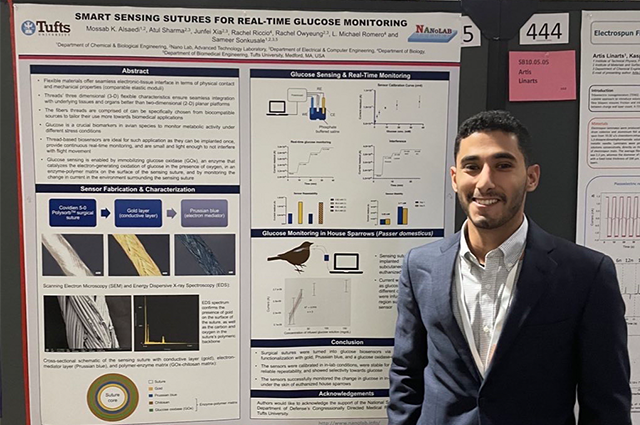Glucose monitoring in birds

At the 2022 Materials Research Society (MRS) Fall Meeting, Mossab Alsaedi, a third-year PhD student in chemical engineering at Tufts, presented a more efficient method of glucose monitoring using smart-sensing threads. Glucose monitoring in bird species helps scientists track avian stress levels. Current methods involve capturing the birds and collecting blood samples. Instead, Alsaedi, a team at Tufts Nano lab, Professor Michael Romero of the Department of Biology and graduate student Rachel Riccio of the Department of Biology used a three-electrode system to integrate a glucose-monitoring sensor into thread, which could then provide more consistent and less invasive monitoring. Once the sutures are put in, scientists can continuously collect real-time data without disrupting the birds’ flight patterns.
Although the research tracked glucose levels, the technology could be developed to monitor other levels such as electrolytes and lactate. Alsaedi presented his poster, titled “Smart Sensing Sutures for Real-Time Glucose Monitoring,” during a symposium focused on materials and devices for wearable electronics. He won a best poster award from the Royal Society of Chemistry, which commended the quality and originality of his research.
Tufts Nano Lab focuses on a range of interdisciplinary fields like biomedical devices, flexible bioelectronics, and low power circuits, among other projects. Several members of Tufts Nano Lab participated in the Materials Research Society Fall meeting, including undergraduate student Ege Ozgul, E23, who presented a novel method of thread-coating for wearable and implantable technology. The Materials Research Society was founded in 1973 and aims to improve the quality of life through advancing materials.
Department:
Chemical and Biological Engineering